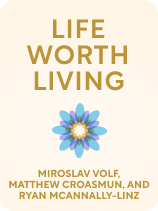

This article is an excerpt from the Shortform book guide to "Life Worth Living" by Miroslav Volf, Matthew Croasmun, and Ryan McAnnally-Linz. Shortform has the world's best summaries and analyses of books you should be reading.
Like this article? Sign up for a free trial here.
How do you deal with hardship? Do you respond in a way that inspires others?
Every year, Yale professors Miroslav Volf, Matthew Croasmun, and Ryan McAnnally-Linz teach a course on living well. Their book Life Worth Living captures the course’s concepts. One of the matters they discuss is how to deal with hardship in the context of a life well lived.
Keep reading for their advice based on insights from philosophers, religious traditions, and literary greats.
How to Deal With Hardship
Volf, Croasmun, and McAnnally-Linz write that hardship is inevitable; at some point, everyone experiences sadness, discomfort, or even anguish. They explain that one’s life philosophy gives direction on how to deal with hardship and discuss two approaches: first, minimizing social harms and second, finding refuge in your beliefs. Let’s explore each.
Minimize Social Harms
Volf, Croasmun, and McAnnally-Linz explain that some thinkers believe you’re obligated to minimize social harms like war, poverty, and racism. One way you can minimize social harms is via “effective altruism,” a utilitarian movement centered around exercising extreme generosity to solve high-priority problems (for example, you might devote your spare time to the AI alignment problem—ensuring AI only benefits and never harms humanity). While this provides direct aid to people in hardship, it may not address the root cause of their suffering—social injustices. If your life philosophy includes working toward social justice, the authors describe three different approaches that may inspire you:
First, the 18th-century English writer Mary Wollstonecraft believed society malfunctions due to gender inequality. Therefore, we should work to give men and women equal educational, political, and economic opportunities. Second, the civil rights activist James Baldwin believed society malfunctions due to white supremacy, which he thought arose because white people felt they needed to dominate others to cope with life’s hardships. Therefore, white people must find healthier coping mechanisms. Finally, the authors say Confucius believed society malfunctions because its leaders aren’t living well. Therefore, we should educate leaders on what it means to live well; then, they can set up social programs that enable regular people to live well, too.
Find Refuge in Your Beliefs
No matter what we do to minimize social harms, hardship may be unavoidable—how should you deal with it? The authors explain that you can deal with hardship by finding refuge in your beliefs. For example, Muslims believe that God created everything that exists, including hardship. This means you should trust that hardship is ultimately a good thing, since it’s part of God’s righteous plan for the universe. Such trust in God can help you endure your anguish with patience and even be grateful for it. Similarly, Friedrich Nietzsche viewed hardship as a valuable part of life because it inspires you to be a better person. If you agree, you can find refuge in the belief that your hardship is helping you become the person who’ll enjoy what tomorrow brings.
(Shortform note: What if you don’t share the belief that hardship is ultimately good or valuable? According to Albert Camus in The Myth of Sisyphus, you can still find refuge in the absurdity of life. Camus believes that life is absurd because death is inevitable, and the meaning of life is indeterminable—and if there’s no greater purpose, hardship is meaningless, too. Instead of letting that get you down, Camus says you should let it inspire you—if nothing matters on an existential level, you’re free to live in the present and pursue whatever fulfills you in the moment.)

———End of Preview———
Like what you just read? Read the rest of the world's best book summary and analysis of Miroslav Volf, Matthew Croasmun, and Ryan McAnnally-Linz's "Life Worth Living" at Shortform.
Here's what you'll find in our full Life Worth Living summary:
- What a life philosophy is and why you should have one
- The four key components of a good life philosophy
- Why contemplating death can motivate you to live more fully






